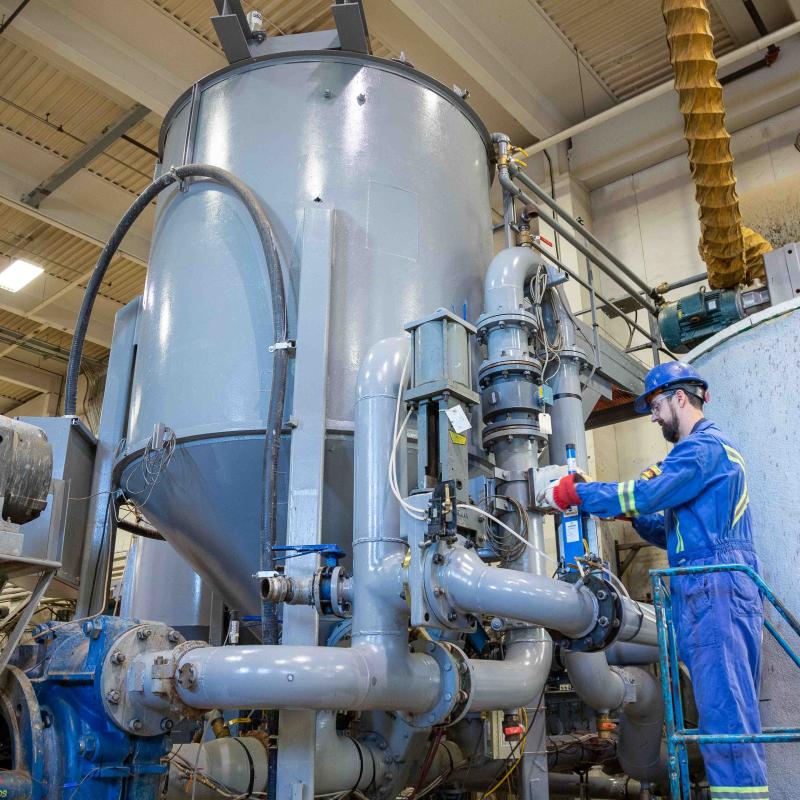Slurry Webinars
About the series
Get immediate access to our slurry-focused webinar series, co-hosted by SRC's Pipe Flow Technology CentreTM and CIM Magazine. This series is designed to help mining operations better understand their slurries, showcasing experts and research.
Webinar 1: An Introduction to Mixing in the Mineral Processing Industry
Mixing is an important and fundamental part of production processes that is sometimes overlooked during design. The simplifying assumptions of equilibrium steady state and well-mixed conditions are rarely found to be the case in real operations. Incorrectly or inadequately designed mixing processes can lead to process upsets and in extreme cases, the failure of an entire process.
An understanding of how mixing affects process outcomes is important for adapting to changing operating conditions and for scaling up or down an existing or new process. This is because mixing is often a precursor to achieving process objectives, such as chemical reactions, mass transfer and heat transfer.
This presentation will provide an overview of fluid mixing processes with a focus on the minerals processing industry. SRC’s Pipe Flow Technology Centre™ will provide an overview of what fluid mixing is, what it means to be “well mixed,” single-phase (blending) compared to multi-phase mixing (e.g., solids suspension), typical mixing equipment and some examples of mixing objectives found in the mining and minerals processing industries.
Meet Your Expert
Imran S has over 13 years of experience in process engineering and industrial fluid dynamics research and design. He obtained a Bachelor of Science and Master of Science in Chemical Engineering from the University of Alberta, where he specialized in industrial mixing and slurry pipeline transport.
Webinar 2: Density Measurement in Slurry Pipeline Flows
Slurry pipeline transportation is an area that has wide reaching applications in the mining and mineral processing industries. Slurry density (or solids concentration) is a key parameter in slurry pipeline design (to determine the solids throughput) and in process plant control (e.g., to determine reagent additions).
Obtaining an accurate and representative measurement of the slurry density is often very difficult. Measuring slurry density is critical as it affects the frictional losses, power duty of the system and determines the solids carrying capacity of the pipeline. Often the method for measuring slurry density is a function of the slurry type. SRC classifies slurries into three types: fine-particle (homogeneous), coarse-particle (settling) and industrial (settling).
In this presentation, these three types will be discussed, along with the appropriate methods and technologies involved with measuring the slurry density for each slurry type. Attendees will come away with a better understanding of the advantages, disadvantages and challenges associated with each technology.
Meet Your Expert
Dr. Ryan S has 20 years of experience in slurry pipeline fluid mechanics and associated industrial operations, including multi-phase mixtures, slurry pipeline transport and tailings operations studies, as well as slurry flow modelling for the mining industry. He is a lead developer of SRC’s PipeFlow Models and an instructor for SRC’s Slurry Pipeline System Courses.
SUBSCRIBE
Stay up to date with the latest mining and energy services, events and news.
About SRC's Pipe Flow Technology Centre
SRC’s Pipe Flow Technology Centre™ is acknowledged as an international leader in its field. Our experts offer an unparalleled degree of experience in assisting industry with practical pipeline applications.
SRC has conducted hundreds of slurry R&D programs and developed a primarily mechanistic model describing the pipeline flow of settling slurries.

contact us
Interested in learning more about our services? Want a copy of the slides? Send us an email.
